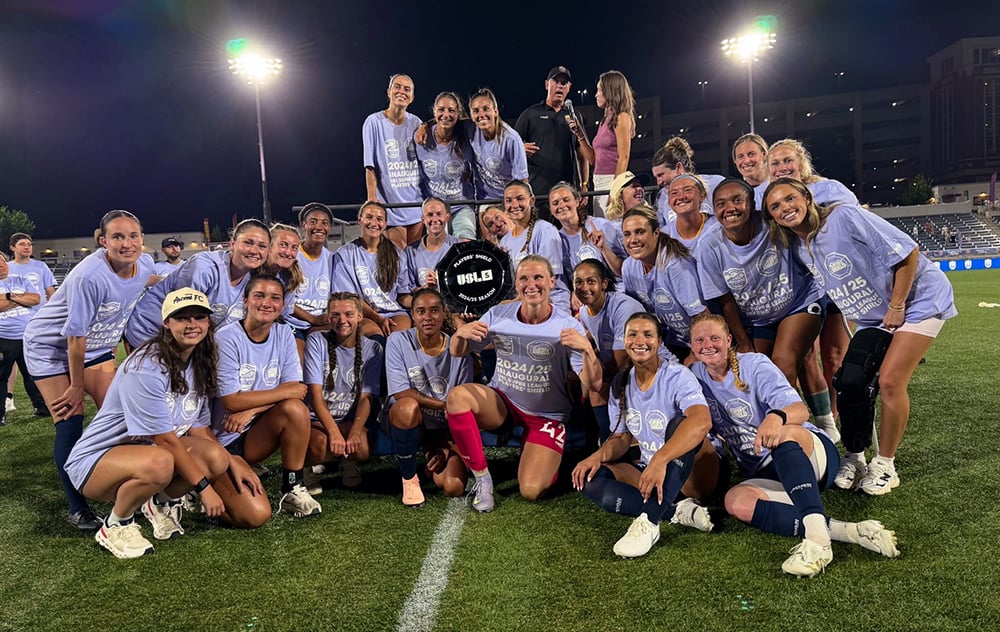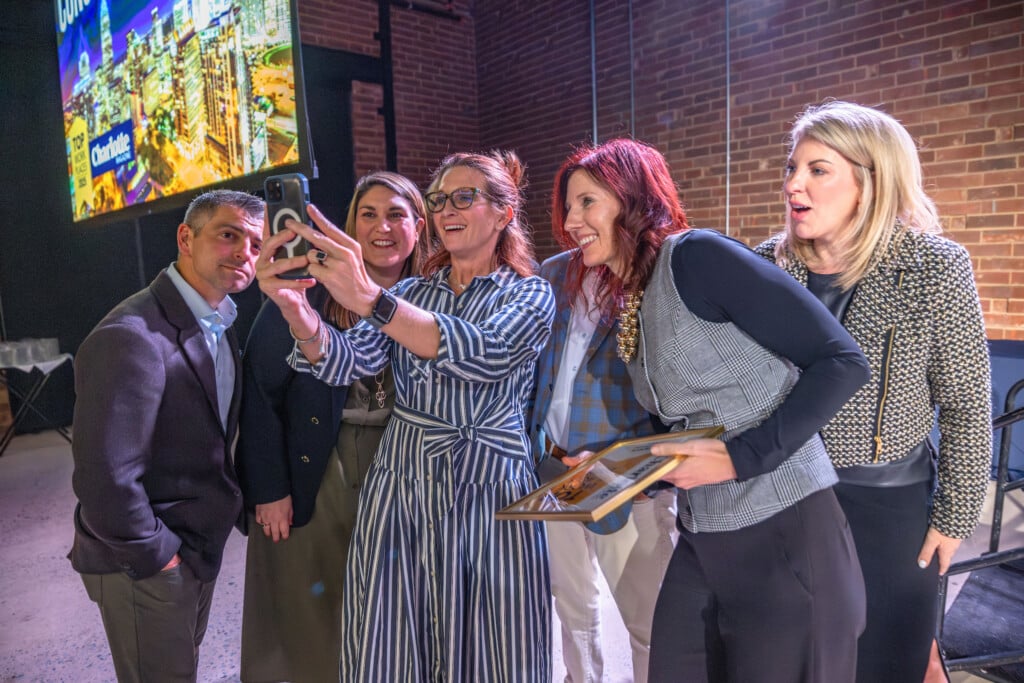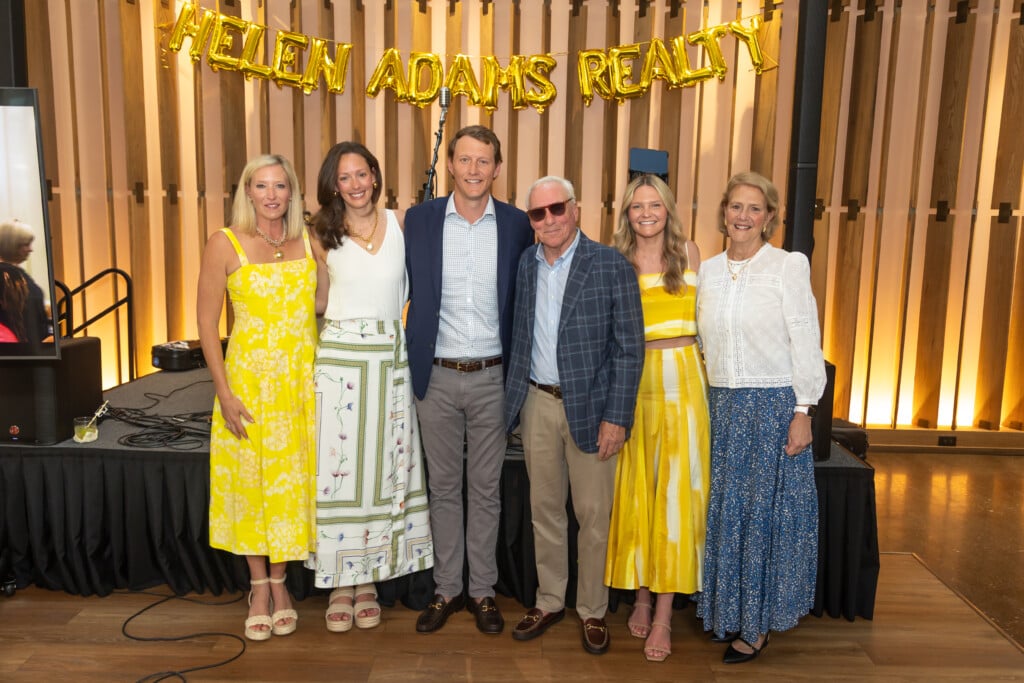The Carolina Ascent Returns Women’s Professional Sports To Charlotte
Strength, skill, and sisterhood marked Carolina Ascent’s inaugural season

As we stand outside the gates of American Legion Memorial Stadium, my 10-year-old daughter clutches my phone, which holds our mobile tickets. Her eyes are wide, and her orange-and-purple Carolina Ascent jersey is two sizes too big. She holds my phone out for the stadium worker to scan. We’re in.
Kickoff is still 20 minutes away, so we find our seats and watch players run drills across the pitch. My daughter holds the team roster, memorizing the athletes and their numbers. “Cannon Clough and B Hylton are from Charlotte!” she says. I point out Josie Studer from Waxhaw and Vicky Bruce and Ashlynn Serepca from Cornelius. Others come from California, Texas, Ohio, and Florida. We’ve been to a few Charlotte FC games, but this is the first time my daughter has seen athletes in bubble braids and hot pink cleats doing what she dreams of doing someday, too.
It’s early June, and the Ascent have already finished first in their inaugural season for the USL Super League. This is an opening-round playoff match against Fort Lauderdale United FC. The stadium is charged with anticipation, and not just from little girls who’ve come to see their sports idols. Young boys line the bleachers, too, rooting for Charlotte’s first professional women’s soccer club.
We spend the next 90 minutes cheering for our team and yelling commands (“Take the shot!”) the players will never hear. We eat strawberry-mango Popsicles as the scorching sun begins to set. During the second half, my daughter stops being a spectator and starts seeing a future version of herself on the field. With the certainty of a rising fifth grader who just made it onto a competitive youth soccer team, she says, “I’m going to be out there someday, too.”
Carolina Ascent FC kicked off its inaugural season in August 2024, and their home opener marked the return of women’s professional sports in Charlotte. (The Queen City’s WNBA team, the Charlotte Sting, folded in 2007.) It’s one of the eight founding clubs of the USL Super League (USLS), and its 26-player inaugural roster included nine athletes from the Carolinas, seven from the Charlotte area.
The USLS was established in September 2021 to provide more opportunities for players within the United States Soccer League (USL) system. The National Women’s Soccer League (NWSL), founded in 2012, is considered the country’s top women’s soccer league. But it has only 14 teams, which left players with few options. The two leagues are potential launchpads to the U.S. Women’s National Team (USWNT), which represents the U.S. at the FIFA Women’s World Cup and the Olympics.
Most Ascent players are too young to remember when Brandi Chastain took off her jersey and fell to her knees after her game-winning penalty kick won the 1999 FIFA Women’s World Cup for the USWNT. That moment was supposed to kickstart professional women’s soccer in the U.S. But corporate sponsors were still cautious about investing in women’s sports, even as the USNWT won multiple World Cups and brought home five Olympic gold medals. Thanks to changing cultural attitudes and players like Alex Morgan and Megan Rapinoe, more platforms showcase women’s sports in general—witness the surging interest in the WNBA—and soccer in particular.
The Ascent intends to keep that ball rolling. The team’s season begins in July with daily practices at Queens College Sports Complex. Players arrive at 9 a.m. to eat breakfast and lift weights in the gym. Then they meet with the coaches to do some video work and go over the day’s agenda. Training starts at 10:30 and generally goes until noon. After lunch, they’re back in the gym until 2:30. Then they go home and do their recovery, which might include massage, cryotherapy, and compression therapy. “It’s a full-time job,” says Head Coach Philip Poole. “They finish in early June and get about a month off, so it’s 11 months all-in, non-stop.”
Poole has lived in Charlotte for 25 years, but his British accent gives him away. He’s originally from Newcastle, England, and came to the U.S. to play soccer at Wingate University. Prior to joining Carolina Ascent, he was an assistant coach for the U.S. Women’s National Team. It’s clear he expects focus and hustle, though his tone is more encouraging than critical. He might make his players run that extra lap, but he’ll fist-bump them when they finish.
Poole began building the Ascent roster in January 2024. The USLS doesn’t have a draft system, so clubs rely on free agents and transfers to build their teams. While he aims for a well-balanced roster, Poole says he likes to sign players with local ties because they appeal to more fans and boost attendance.
By August 2024, his final roster included defender Vicky Bruce of Cornelius, who scored the first goal in USL Super League history. Forward Audrey Harding of Akron, Ohio, logged the first assist. Stella Spitzer of Columbus, Ohio, was just 14 when she signed with the Ascent, and the high school sophomore became the youngest player in league history to take the pitch. (The USLS doesn’t have an age minimum. It follows the USL’s philosophy: “If you’re good enough, you’re old enough.”)
“We got such a good mix of players,” Poole says. “I mean, even just look at these two.” He points to forward Rylee Baisden, 31, and midfielder Chloe “B” Hylton, 18. Both are running drills with my daughter and her friend while Coach Poole and I chat on the sidelines. With his hands on his hips, he says to the younger girls, “Go easy on them, will ya?”

Baisden and Hylton run drills with the author’s daughter and her friend as Coach Philip Poole looks on.
Baisden’s club career took her to Sweden, France, and Australia before she signed with the Ascent. Hylton is a Charlotte native who decided to forgo collegiate soccer and became the club’s first academy player to make the leap directly to the pros. Though there are 13 years between them, they have a wordless chemistry on the pitch and a natural ease with my daughter and her friend as they do side shuffles. They’re not required to do community service or make public appearances, but Baisden, Hylton, and their teammates choose to guest-coach local youth soccer teams, volunteer at the Humane Society, or speak at professional women’s conferences. They recognize the impact they can have on the next generation of athletes, and they know visibility matters.
“I’ve played overseas and for the National Women’s Soccer League, so I’ve played far away from family and friends for a really long time,” Baisden tells me with a confidence grounded in experience, not ego. “Being able to come back to the States and coming to a new league in its inaugural season was a risk, but I think with risk comes reward, and I think that showed this last year with our team.”
Hylton attended Covenant Day School and played soccer for Charlotte Development Academy (CDA), where she was named Player of the Year twice while playing at the U19 level. Her quick footwork and ball control make coaches do double-takes, but it’s clear she doesn’t realize how good she is—yet. “Growing up, it was always like college was what you would do,” Hylton says. “Now that I have this platform that I get to jump straight into, and I have awesome older players like Rylee who get to show me the ropes of professional soccer, it’s really cool.”
When her instincts on the pitch take over, Hylton surprises even herself. On April 12, in a 5-0 victory against Brooklyn FC, she became the club’s youngest goal scorer at 17 years, 352 days old. “She’s Charlotte’s best young player,” Poole says. “She didn’t have this at 10 years old. Can you imagine if she did? She’s already a top professional player at 17. But if she had had this to aspire to, who knows where she would be now?”

More than 7,000 fans showed up to American Legion Memorial Stadium on May 17 for the Ascent’s match against Tampa Bay Sun FC.
Unlike the Dallas Cowboys Cheerleaders, Ascent players don’t have to work a second or third job to make a living wage. The league covers players’ housing and benefits, and they have side hustles only when they want to. “We take great pride in the fact that their salaries are pretty good,” Poole says. “When they can concentrate on being professional athletes as opposed to saying, ‘Hey, maybe I need a second job to supplement this and chase this dream,’ they can focus on their craft. When we have happy players, we get a better product.”
Their strategy worked. On May 17, at their final home game of the regular season versus the Tampa Bay Sun, the Ascent clinched the Players’ Shield, awarded to the team with the best regular-season record. That same night, Charlotte FC was taking on Chicago Fire FC at Bank of America Stadium, the PGA Championship was in town, and the NASCAR All-Star Race was happening at the North Wilkesboro Speedway. The Ascent still drew 7,000 fans.
It could be the Caitlin Clark effect, but Poole thinks something bigger is at play. “In women’s sports, you have a tendency to shrink it and pink it, but we don’t have to think like that,” he says. “We have to think long-term. When you’re in the stadium, you can see that it’s a great family night out that’s considerably less on the pocketbook than a Panthers or an FC or a Hornets game. And I don’t want to sound too cutesy, but when you get to inspire young kids and families, and it’s not killing them financially, that’s important.”
At season’s end, goalkeeper Meagan McClelland earned the Golden Glove Award for the lowest goals-against average in the league, while Jill Aguilera picked up the Golden Playmaker Award for her league-leading seven assists. Team Captain and NC State alum Taylor Porter earned the title of “Iron Woman” as one of four players in the Super League to play every minute, and Poole picked up the Coach of the Year award. The Ascent also recorded the highest attendance—and the most jersey sales—in the league.
“If you look at the season overall, we exceeded a lot of expectations,” Poole says. “But I’m a competitor. Even if we’d won everything, I’d still say, ‘OK, you can do it once. But can you do it twice?’”
The sun finally sets around 8:30, well into the second half. The teams are tied 1-1 when the game goes into overtime. Fort Lauderdale scores the winning goal in the 120th minute. Carolina fans insist that the scorer was offsides. A woman in the bleachers beside us is livid. “That ref did us dirty,” she says, shaking her head.
We leave sunburned and sweaty, sticky from our Popsicles, and a little deflated. My daughter really wanted that win. But a few years from now, she won’t remember the final score. She’ll remember going to a place where women commanded the field under those stadium lights and made her dreams feel possible.






